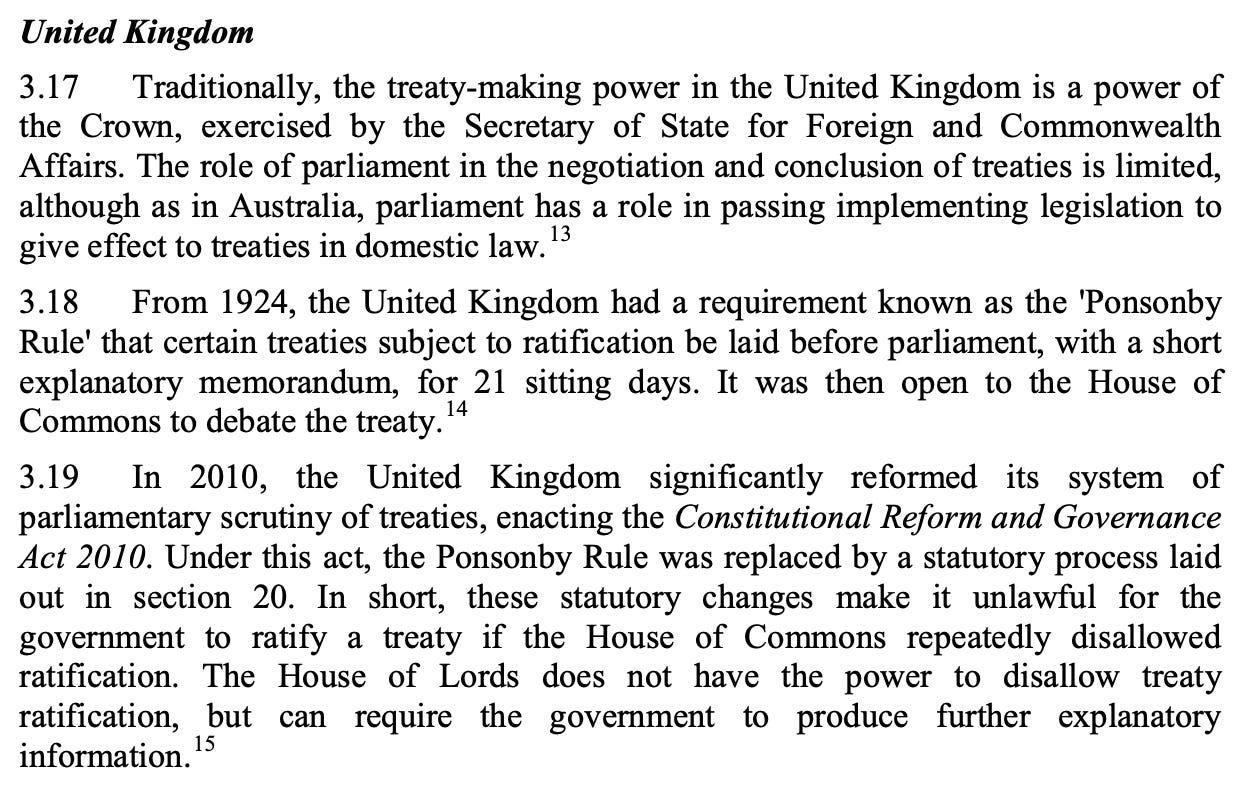Unravelling the knots in your mind...
It seems like someone (Sir Philip Barton?) in the United Kingdom's Foreign, Commonwealth & Development Office (Foreign Ministry) may have "neglected" to properly perform their duties.
Are you confused about what is going on with the World Health Organization?
Please watch the videos below…
SUMMARY:
Please realize that this is a worldwide issue that is manifesting in a very interesting way in each and every country around the world.
The details in THIS article are in regards to the United Kingdom. I have written extensively about the situations in other countries around the world.
On May 27, 2022, amendments to the International Health Regulations were adopted by the 75th World Health Assembly.
They can still be rejected, but that must happen before December 1, 2023.
Have the public servants who are responsible for the proper handling of the amendments done their job? Maybe, but I have been unable to find any evidence to support that they have performed their duties properly.
It seems that the amendments were never submitted to the UK Parliament as required:
Under Part 2 of the Constitutional Reform and Governance Act 2010 (CRaG) no treaty… can be brought into force unless it has been laid before Parliament for 21 sitting days without either House having resolved that the UK should not demonstrate its consent to be bound.
https://www.gov.uk/government/publications/treaties-and-mous-guidance-on-practice-and-procedures
If anyone can find evidence that the amendments were properly submitted to the UK Parliament for their consideration (for 21 sitting days), please share any such evidence with me. +1 310-619-3055
The excerpts below are from Sections 20 and 25 of the United Kingdom’s Constitutional Reform and Governance Act 2010
Section 20. Treaties to be laid before Parliament before ratification
(1) Subject to what follows, a treaty is not to be ratified unless—
(a) a Minister of the Crown has laid before Parliament a copy of the treaty,
(b) the treaty has been published in a way that a Minister of the Crown thinks appropriate, and
(c) period A has expired without either House having resolved, within period A, that the treaty should not be ratified.
(2) Period A is the period of 21 sitting days beginning with the first sitting day after the date on which the requirement in subsection (1)(a) is met.
Section 25. Meaning of “treaty” and “ratification”
(1) In this Part “treaty” means a written agreement—
(a) between States or between States and international organisations, and
(b) binding under international law.
The double negative used in the text below seems to mean that amendments to existing agreements ARE treaties.
Section 25. Meaning of “treaty” and “ratification”
(2) But “treaty” does not include a regulation, rule, measure, decision or similar instrument made under a treaty (other than one that amends or replaces the treaty (in whole or in part).
Amendments to legally-binding agreements must also be considered and handled, in and of themselves, as legally-binding agreements.
The excerpts below are from this document…
RESPONSIBILITY FOR CONCLUDING TREATIES
The responsibility for concluding treaties involving the UK lies with the Secretary of State for Foreign, Commonwealth and Development Affairs. The Foreign, Commonwealth and Development Office (FCDO) is responsible for Foreign, Commonwealth and Development policy aspects of all treaties, as well as for dealing with questions of form and procedure. It also considers points of international law.
This remains the case even when the negotiation of the treaty is led by other government departments i.e. the department which will carry out the treaty's provisions. FCDO Legal Advisers and FCDO Treaty Section must be given the opportunity to comment on the drafts of all treaties under negotiation to ensure that they are drafted in accordance with correct international practice.
-page 3
(i) EXPLANATORYMEMORANDA(EMs)
Since the coming into force of the CRaG Act in 2010, any treaty laid before Parliament under Part 2 of the Act must be accompanied by an Explanatory Memorandum (EM).
GUIDELINES ON EMs FOR TREATIES
Introduction
An EM brings to the attention of Parliament the main features of the treaty with which it is laid. The aim of an EM is to improve the information about treaty matters which is provided to Parliament by the Executive.
-page 11
LAYING BEFORE PARLIAMENT AND PUBLICATION
As soon as possible after signature, a copy of the treaty is sent to the Government Printer to be published as a command paper for presentation to Parliament.
Publication is arranged by Treaty Section. Printing, proof-checking and laying can take several months. If it is necessary to ratify a treaty within a certain period Treaty Section should be alerted in good time so that the necessary arrangements can be made for laying and publishing.
Under Part 2 of the Constitutional Reform and Governance Act 2010 (CRaG) no treaty… that is subject to ratification, acceptance, approval, the mutual notification of completion of procedures, or to which the UK intends to accede, can be brought into force unless it has been laid before Parliament for 21 sitting days without either House having resolved that the UK should not demonstrate its consent to be bound (e.g. ratify, accede).
-page 9
The language above is difficult to understand, but it basically means that treaties laid before Parliament are ASSUMED to be accepted unless they are PRO-ACTIVELY rejected by Parliament.
The Foreign, Commonwealth & Development Office (FCDO) is a department of the Government of the United Kingdom. Equivalent to other countries' ministries of foreign affairs, it was created on 2 September 2020 through the merger of the Foreign & Commonwealth Office (FCO) and the Department for International Development. The department is responsible for representing and promoting British interests worldwide.
The head of the FCDO is the Secretary of State for Foreign, Commonwealth and Development Affairs, commonly abbreviated to "Foreign Secretary". This is regarded as one of the four most prestigious positions in the Cabinet – the Great Offices of State – alongside those of Prime Minister, Chancellor of the Exchequer and Home Secretary.
The FCDO is managed day-to-day by a civil servant, the permanent under-secretary of state for foreign affairs, who also acts as the Head of His Majesty's Diplomatic Service.
Sir Philip Barton took office as permanent under-secretary on 2 September 2020.
Secretaries of State for Foreign, Commonwealth and Development Affairs
Elizabeth Truss
Secretary of State for Foreign, Commonwealth and Development Affairs from 15 September 2021 to 6 September 2022
https://www.gov.uk/government/people/elizabeth-truss
James Cleverly
Secretary of State for Foreign, Commonwealth and Development Affairs from 6 September 2022 to 13 November 2023
https://www.gov.uk/government/people/james-cleverly
David Cameron
Secretary of State for Foreign, Commonwealth and Development Affairs from 13 November 2023 to present
Excerpts:
DOCUMENTS REQUIRED BY FCDO TREATY SECTION
The originals of treaty documents should always be sent to Treaty Section, which arranges for their publication as command papers and laying before Parliament. It also arranges for their transfer to the National Archives for permanent preservation upon entry into force for the UK and for their registration with the United Nations in accordance with Article 102 of the Charter of the United Nations.
-page 4
It is for the government department responsible for the subject-matter of the treaty (“the lead department”) to prepare the initial draft and to maintain an up to date version as amendments are made during negotiations. All drafts and subsequent amended versions should be dated. Drafts which undergo significant amendment should be cleared again as necessary with FCDO. It is helpful to have amendments highlighted in some way.
-page 5
The lead department should never make any commitments to the other party or parties about the preparation of documents or about dates for signature without first consulting all relevant FCDO departments, and in particular Treaty Section.
-page 5
In international law a head of state, head of government or foreign minister may sign a treaty in their own right. In UK practice, the Monarch does not sign treaties, but the Prime Minister sometimes does. Anyone else needs to produce Full Powers from one of those three. Full Powers is the document produced as evidence that the person named in it is authorised to represent the state in performing certain actions in relation to the conclusion of a treaty, in particular signature. Full Powers are normally signed by the Foreign, Commonwealth and Development Secretary. However, it is established practice for FCDO ministers and certain UK Representatives to hold General Full Powers signed by the Monarch (usually known as “general full powers”) giving them authority to sign any treaty (in practice subject to being instructed by the FCDO in each case). Anyone else signing a treaty on behalf of the UK requires Specific Full Powers enabling them to sign a specified treaty.
-page 6
RATIFICATION OF TREATIES OVERVIEW
Treaties are frequently subject to ratification, acceptance, approval, or the mutual notification of the completion of procedures.
In addition, multilateral treaties may be acceded to, which is a one-step process that does not involve signature.
The date of entry into force is determined by the provisions of each treaty. It is important to note that from the date a treaty enters into force for the UK, it places international obligations on the UK vis- a-vis the other party or parties. It is essential therefore that the UK is able to fulfil its obligations as from that date, and does not become legally bound until it has in place the necessary domestic powers to give effect to the terms of the treaty; otherwise it will be in breach of its international obligations. Pleading insufficiency of or incompatibility with domestic law is not, in international law, an acceptable excuse for failure to implement the terms of a treaty.
Accordingly, if domestic legislation is required to enable the UK to give effect to its obligations under a treaty, the legislation should be in place before the treaty comes into force, so that the two can come into operation at the same time. It is FCDO practice, therefore, to insist that any necessary UK legislation, for example, an Act of Parliament or Order-in-Council, must be in place before the UK ratifies or accedes to a treaty. A written assurance at Deputy Director level (known as a Letter of Legal Assurance) is consequently required from the lead department responsible for the treaty assuring the FCDO that all legislative steps will have been completed before the UK instrument of ratification or accession is deposited.
-page 8
(i) GLOSSARY
Acceptance/Approval: have the same legal effect as ratification.
Accession: single act whereby a state expresses its consent to be bound, instead of signature followed by ratification. Accession is only used in the case of multilateral treaties.
Full Powers: a formal document signed by the head of state or government or the Foreign Minister empowering the person (or persons) named to sign a treaty on behalf of that state.
Ratification: follows signature and signifies the consent of a state to be bound by the treaty.
Signatory: not a precise term. Should not be used when referring to a state which is a party to a treaty through ratification or other means.
Signature: is the act whereby a state expresses its agreement in principle with a treaty, but not its consent to be bound by it (simple signature), unless the treaty provides that it will come into force on signature (definitive signature). A state which has signed a treaty which is subject to ratification is not obliged to ratify. However, it is obliged to refrain from acts which would defeat the object and purpose of the treaty, until it shall have made its intention clear not to become a party to the treaty. UK policy is in general not to sign without a reasonably firm intention to ratify.
Treaty: an agreement concluded between States (or with or between international organisations) in written form and binding in international law, whether embodied in a single instrument or in two or more related instruments and whatever its particular designation. It does not have to be signed, although it usually is.
-pages 27-29
LEARN MORE:
RejectTheAmendments.com
CanadianPetition.com
ThePeoplesDeclaration.com
ExitTheWHO.org
ExitTheWHO.com
StopTheGlobalAgenda.com
StopTheAmendments.com
StopTheWHO.com
ScrewTheWHO.com
MaskCharade.com
RejectDigitalEnslavement.com
HealthFreedomBillOfRights.com
James Roguski
The old system is crumbling, and we must build its replacement quickly.
If you are fed up with the government, hospital, medical, pharmaceutical, media, industrial complex and would like to help build a holistic alternative to the WHO, then feel free to contact me directly anytime.
JamesRoguski.substack.com/about
JamesRoguski.substack.com/archive
310-619-3055
All content is free to all readers.
All support is deeply appreciated.













LOVE the Bart picture and the connotation.
This is all about double speak; conspiratorial secrecy; endless deceptive unlawful legalize; all buried in a massive word salad with no meat in it.
Many people have no idea, that anything is going on, at all.
Many who know something is definitely going on, cannot figure out exactly what, and just give up.
Many who persist in trying to figure out what is really going on, often get so tangled up, they tend to become immobilized by confusion.
The ball is in the hands of the rest.
Thank you James and others, for persisting in unraveling the tangle, clearing the table of the useless word salad, identifying the meat and putting it on the table in plain sight.
Treasonous, traitorous, treacherous people undermine themselves.
They will choke on their own word salads.
They will get entangled in the cords of their own deception, trip and fall.
We can win.
We will win.
Regardless.
https://t.me/wch_org/4462
🔴 Dr Tess Lawrie's petition on IHR (2005) to hold a Parliamentary vote to reject amendments.
[116,391 signatures]
“Thank you to everyone who signed this petition. It is probably the most important issue of our time.
I have been notified by the Petitions Committee that this debate [in UK Parliament] is to be held on the 18th December 2023.
Whilst this falls after the period allowed to reject the amendments already adopted in May 2022, it remains an important step to raise awareness of the issues.
The debate has been termed 'non-substantive'. As such it will not lead to a vote, and MP attendance is optional.
Don't be disheartened by these facts. They highlight that we will need to work harder to raise awareness of the great risk to health, freedom and sovereignty posed by the IHR amendments to be approved at next year's World Health Assembly in May 2024. “